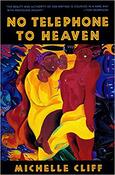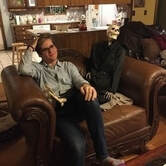Sacred Chickens
Menu
SACRED CHICKENS
 No Telephone to Heaven Author, Michelle Cliff by Jarad Johnson I recently read a book called No Telephone to Heaven by Michelle Cliff. She also used the novel to analyze gender, but in a different, less direct way than in Ashputtle or the Mother’s Ghost (I discussed some thoughts about that book here). The novel itself is highly lyrical, and that make it hard to summarize. It also deals with many different issues, which could take up several pages. Suffice it to say that it centers around Clare, and her immigration to America, her eventual return to Jamaica and the economic hardships that she finds there, and her relationship with Harry/Harriet, and all of the gender and sexuality issues that stem from that. It is a novel with a broad scope and a disjointed timeline, but very much worth the read. Cliff describes Harry/Harriet as, “the novel’s lesbian in a sense; he’s a man who wants to be a woman and he loves women.” While that is a good description of the character, I think that s/he is ultimately more queer than anything else. To be queer, which was a word originally used to describe something abnormal and/or strange, according to a theorist named Green* refers to an, “emphatic pluralizing of sexuality [that] resists the normative dualistic economy that limits erotic activity,” and, “insists on a radical rethinking of the ways we participate in and conceptualize the world.” Put simply, Green is saying that to be queer is to reject the ways in which we view sexuality and seeks to reshape our perceptions of sex and gender as less rigid, to give them a fluidity unencumbered by labels. This definition suits Harry/Harriet much better, and if that is the case then, essentially, the character represents a duality of self that our culture and way of thinking do not easily tolerate. We see this duality throughout the book, but one example is when Cliff uses the phrase, “From her boyhood”, a small thing, but it just shows how present that duality is in the book. It also demonstrates how Clare, who is one of the main characters in the novel and is in a relationship with Harr/Harriet herself recognizes this duality and does not immediately dismiss s/he for it. The duality of Harry/Harriet is not just thrown in at random intervals throughout the novel, it’s woven into the whole of the story. In some sense, the novel itself is very much like Harry/Harriet. It has its own duality, in that it is both a Jamaican novel and an American novel, and it attempts to represent both cultures as accurately as possible. Jamaica itself is paradoxical, an independent nation with its own culture, problems and everyday reality for its citizens. The flip side to that portrait of Jamaica is the way that it is seen by many tourists, which is just as a place for entertainment and vacation, a place there to serve them. That is because in the eyes of western, white society, Jamaica is still viewed as less than. But that novel is not unique unto itself; indeed everyone, from the most “masculine” to the most “feminine” person, has aspects of themselves that do not exactly conform to what society expects of them. Even those who actively try to conform to their gender expectations will eventually fall short of them. While this can in some instances cause lasting psychological turmoil, it is also a good thing, because the ideals of gender, as perpetuated by western civilization, are contrived and ridiculous, and they incontrovertibly tie one’s gender to one’s ego, and that is ultimately very dangerous. From that, we see toxic masculinity among other things, a huge and, unfortunately, seemingly everlasting societal problem. Harry/Harriet is the epitome of duality in this novel. S/he is both bisexual and biracial, so in all aspects of their life s/he possess this duality. Notably in the novel, Harry/Harriet never undergoes a physical transformation, when it could have arguably been the easier road to travel, to conform to society’s expectations. If we use the lens of queer theory is used to examine the novel, and more specifically the character Harry/Harriet, what message is gleaned there? That can only really be determined by the reader, but what I take from it is that Harry/Harriet, of all the characters in the novel, gives us the most insight into the culture that s/he lives in. I find that it is always those who are somewhat outside of a social system or structure, and those who are ridiculed by it, who are able to reveal the most about it. About this character, the author said that she wanted to, “Portray a character who would be the most despised character in Jamaica.” From that, the reader can infer that the society of Jamaica, from the author’s point of view at least, is as unaccepting of anyone outside the gender norm as our own society, if not more. So, if Harry/Harriet is intended to be a mirror through which the reader views Jamaica, what then do we see? I personally see a society, much like my own, in need of reform, and in need of a new perception when it comes to gender, instead of the limited scope that the author suggests is there. We can only hope to come to a place where Ashputtle doesn’t need a man to be happy and independent from her horrible family, and where Harry/Harriet is not the most hated person in Jamaica. We see so many of the ideals about gender expounded upon in these texts, sometimes to make a point, and sometimes just because they are reflecting how prevalent it is in our own society. These things must be acknowledged before they can be changed. *Greene, Frederick L. “Introducing Queer Theory into the Undergraduate Classroom: Abstractions and Practical Applications.”  Bio: Jarad is the co-administrator and writer for Sacred Chickens, attends college at MTSU, loves tea, and tries to spend every spare second reading. Jarad is an English major. Bless his heart! Let's all light a candle for him and send him happy thoughts!
0 Comments
Leave a Reply. |

Click Photo above to buy ebook or paperback from Amazon.
Here's the link to Barnes and Noble Or order through your favorite independent bookstore! Categories
All
|
 RSS Feed
RSS Feed